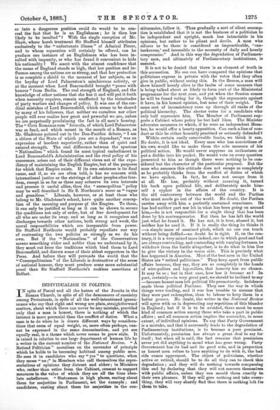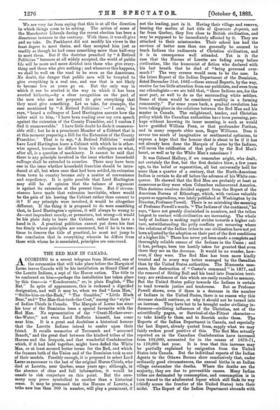INDIVIDUALISM IN POLITICS.
IN spite of Pascal and all the haters of the Jesuits in the Roman Church, in spite of all the denouncers of casuistry among Protestants, in spite of all the well-intentioned ignora- muses who say that right and wrong are plain, straightforward matters, about which there can never be any mistake, provided only that a man is honest, there is nothing of which the interest is more perennial than the conflict of duties. What a man is to do when he is drawn different ways by considera- tions that seem of equal weight, or, more often perhaps, can- not be expressed in the same denomination, and yet are equally real, is a theme which never seems to grow stale. It is raised in relation to one large department of human life by a writer in the current number of the National Review. "A Retired Politician" moralises on the surrender of principle which he holds to be becoming habitual among public men. He sees it in candidates who say "yea" to questions, when they mean "no;" in Members who call themselves the repre- sentatives of opinions they distrust and abhor; in Ministers who, rather than retire from the Cabinet, consent to support measures in the value of which they are all the time abso- lute turbelievera. "Statesmen in high places, tasting about them for majorities in Parliament, set the example ; and candidates, casting about them for majorities in the con-
stituencies, follow it. 'Thus gradually a sort of silent assump- tion is established that it is not the business of a politician to be independent and upright, much leas intractable in his opinions, but rather to be pliant and docile. A man who refuses to be these is considered as impracticable, can- tankerous,' and insensible to the necessity of daily and hourly compromise." And in this way the degradation of Parliamen- tary men, and ultimately of Parliamentary institutions, is ensured.
• It is not to be denied that there is an element of truth in this accusation. No one can have compared the opinions that politicians express in private with the votes that they often give in public, without seeing this. In the Recess, a man will show himself keenly alive to the faults of some measure that is being talked about as likely to form part of the Ministerial programme for the next year, and yet when the Session comes he will be found voting for it, though the arguments against it have, in his honest opinion, lost none of their weight. The same sort of inconsistency runs up through all ranks of the political hierarchy. The elector votes for a candidate who only half represents him. The Member of Parliament sup- ports a Cabinet whose policy he but half likes. The Minister advocates measures to which, if he were an independent Mem- ber, he would offer a hearty opposition. Can such a line of con- duct as this be either honestly practised or seriously defended?
Within certain easily conceivable limits, we think it can. No doubt, it is not ideal. Every man who has convictions of his own would like to make them the sole measure of his political action. He would never suppress an enthusiasm or put a dislike into his pocket. He would vote on every question presented to him as though there were nothing to be con- sidered but the character of the particular proposal. But the man who assumes this attitude does not escape as completely as he probably thinks from the conflict of duties of which we have spoken. In fact, he does not escape from it at all. He has, probably without meaning it, turned his back upon political life, and deliberately made him- self a cypher in the affairs of the country. It is the old controversy between the world and the Puritan who must needs go out of the world. No doubt, the Puritan carries away with him a perfectly unstained conscience. He has had neither part nor lot in what has been going on around him,—he is not responsible for a single thing that has been done by his contemporaries. But then he has left the world just what he found it. He has not, it is true, abused it, but neither has he used it. If it is really the thing he thinks it —a simple mass of unmixed pitch, which no one can touch without being defiled—no doubt he is right. If, on the con- trary, it is a very mixed mass indeed, one in which good and bad are always contending, and contending with varying fortunes, to withdraw from the battle altogether, is to do what in him lies to give the victory to the worse side. This is precisely what has happened in America. Most of the best men in the United States are "retired politicians." They keep apart from public affairs because, they say, they are so completely in the hands of wire-pullers and log-rollers, that honesty has no chance. It may be so ; but in that case, how has it become so ? It part, certainly—in very great part, we should be inclined to say —because honest men left political life prematurely. Indolence. made them political Puritans. They saw the way in which things were tending, and it was less trouble to assume that they were past redemption, than to labour to keep them in a better groove. No doubt, the writer in the National Review will agree with us in deprecating any repetition of this blunder in England ; but if it is to be avoided, there must be some kind of common action among those who take a part in public affairs ; and all common action implies the surrender, to some extent, of individual opinions. To say that Party Government is a mistake, and that it necessarily leads to the degradation of Parliamentary institutions, is to become a pure pessimist. Unfortunately, pessimism has always a great deal to say for itself ; but when all is said, the fact remains that pessimism never yet did anything to mend what has gone wrong. Party Government has its bad and its good side, and in proportion as honest men refuse to have anything to do with it, the bad side comes uppermost. The object of politicians, whether active or retired, should be to do all they can to check this degradation ; and they will do nothing towards compassing this end by declaring that they will not concern themaelves with public affairs, unless they can mould them exactly to their own pleasure. If they will give nothing and take every- thing, they will very shortly find that there is nothing left fly them to take. We are very far from saying that this is at all the direction in which things seem to be setting. The action of some of the Manchester Liberals during the recent election has been a disastrous instance to the contrary. With them, it was all give and no take. Dr. Pankhurst did not modify his views in the least degree to meet theirs, and they accepted him just as readily as though he had come something more than half-way to meet them. But if the doctrine preached by "A Retired Politician" becomes at all widely accepted, the world of public life will be more and more divided into those who give every- thing and those who give nothing ; and whenever this happens, we shall be well on the road to be even as the Americans. No doubt, the danger that public men will be tempted to give everything is a real one, and one that is not likely to become less as years go on. But the only way in which it can be averted is the way in which it has been averted hitherto,—by a clear recognition on the part of the men who are not prepared to give everything that they must give something. Let us take, for example, the case mentioned by "A Retired Politician :"—" I once," he says," heard a colleague of Lord Hartington narrate how the • latter said to him, I have been reading over my own speech against the extension of the County Franchise, and I confess I find it unanswerable.' I have little doubt he finds it unanswer- able still ; but he is a prominent Member of a Cabinet that is at this moment preparing a Bill for the Extension of the County Franchise." That is to say, "A Retired Politician" would have Lord Hartington leave a Cabinet with which he is other- wise agreed, because he differs from his colleagues on what, after all, is a question of machinery. It cannot be said that there is any principle involved in the issue whether household suffrage shall be extended to counties. There may have been one in the issue whether household franchise should be intro- duced at all, but when once that had been settled, its extension from town to country became only a matter of convenience and expediency. It is quite possible that Lord Hartington may still be of opinion that the balance of argument is against its extension at the present time. But if circum- stances have made that extension inevitable, where would be the gain of his leaving the Cabinet rather than consent to it I If any principle were involved, it would be altogether .different. If the thing it is proposed to do were something that, in Lord Hartington's opinion, it will always be wrong to do—not imprudent merely, or premature, but wrong—it would be his plain duty to leave the Cabinet, rather than have a hand in it. A practical politician cannot put down his foot too firmly where principles are concerned, but if he is to con- tinue to deserve the title of practical, he must not jump to the conclusion that in everything wherein he differs from those with whom he is associated, principles are concerned.



































 Previous page
Previous page